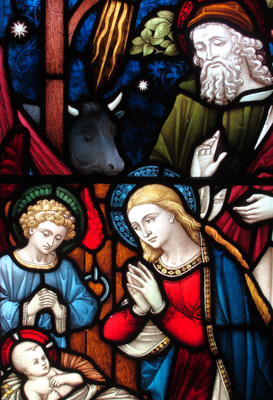(RNS) It’s Christmas time once again and Christian worshippers are laying aside their modern translations of the Bible in order to listen to the King James Version (KJV) of the Christmas story. This version is, after all, the 400-year-old translation they have always heard. For many listeners, the Christmas holidays begin with the familiar words: “And there were in the same country shepherds abiding in the field.”

A stained glass window at St. Andrew’s Episcopal Cathedral in Honolulu, Hawaii, depicts the birth of Jesus. RNS photo by Kevin Eckstrom.
As special as the KJV sounds to modern ears with its rhythmic cadences and its quaint vocabulary, there is nothing special about its origin. In fact, the translation of the KJV was an official government project, much like Social Security and Medicare. But it was never properly funded, not even by the monarch who came up with the idea.
Not that James I of England was stingy. Far from it! He loved to give expensive gifts to his friends, and perpetually had holes in his budget that he never patched, even when it was clear to everyone who mattered that he was living beyond his means.
James had inherited an official Bible from the Elizabethan Church, the so-called Bishops’ Bible. Its translation was badly done, often obscure and generally disliked by everyone who had the right to an opinion. The most popular English Bible by far was the unauthorized Geneva Bible, translated into vigorous English by exiles in Geneva, complete with notes, maps and illustrations.
But James loathed the Geneva Bible in spite of its unchallenged popularity. The translation was far too Puritan in its sentiments for his taste. For example, whenever the original text of the Bible used the word “king,” the Geneva translators invariably—and, from James’ perspective, inexcusably—rendered it in English as “tyrant.” No king with even a modicum of political sense could let that seditious translation stand unchallenged, much less appoint it to be read in churches.
So James asked 50-plus translators to revise and improve the Bishops’ Bible in light of the original Greek, Hebrew and Aramaic texts. The new translation they obligingly produced in 1611 was not a mere patchwork of existing translations. Such a careless translation might have displayed no regard for the original ancient languages or the rhythms and music of the early modern English. The translators were determined to make David sing like an Englishman.
At the same time, the translators remained as literal as possible in their rendering of the text. Simple English parishioners, literate and illiterate alike, should hear the word of God as it was originally spoken by prophets and apostles and not as the translators might have preferred it to be understood. If not, why appoint it to be read in churches?
When a representative committee met to approve the final text of KJV, they had original texts and earlier English translations in front of them but no proposed copy of the KJV translation. Instead, the text of the KJV was read aloud to them. They heard it as parishioners would hear it in their parish churches.
After all, large portions of the Bible were spoken before they were written, and the acts of reading and preaching restored the Bible to its original spoken form. The KJV was therefore intended to be part of the auditory event in which ordinary men and women encounter the living God. “Faith,” the Apostle Paul said, “cometh by hearing.” If so, what more appropriate method could be devised to approve the final draft of the text than by hearing it read?
Judged by their own standards, the translators achieved most of the goals they set for themselves: They corrected the mistakes and theological howlers in earlier translations. They used no words that were not in common use at the time. And they translated the text as literally as they could without damaging the integrity, beauty, majesty and inherent music of the English language. In short, they gave James everything he had hoped for when he first proposed the new Bible.
Of course, there were limitations. The first edition was unfortunately marred by some mistakes and a shameful number of printer’s errors. Nevertheless, the KJV—warts and all—has had an incredible longevity. Americans can buy a copy of the KJV in almost any bookstore without the least difficulty. Even today, most Protestants learn the Lord’s Prayer and the Twenty-third Psalm in King James English—and it is in the KJV that they first hear the Christmas story.
If there is a Christmas message in the story of the KJV, it is that unlikely origins do not preclude satisfying endings. The KJV began as an underfunded government project sponsored by a financially strapped king—not an auspicious beginning for any royal initiative, much less a new translation of the Bible. But it ended as a demonstration of the theological conclusion that the wisdom of God, which often transforms what appears to be sheer folly into something wonderfully wise, has done it again—this time in the case of the improbably successful KJV.
Every Christmas reminds us just how wise something wonderfully wise can be. Which is why we are listening once again for the “shepherds abiding.”
(David C. Steinmetz is the Kearns Distinguished Professor Emeritus of the History of Christianity at the Divinity School of Duke University in Durham, N.C.)




